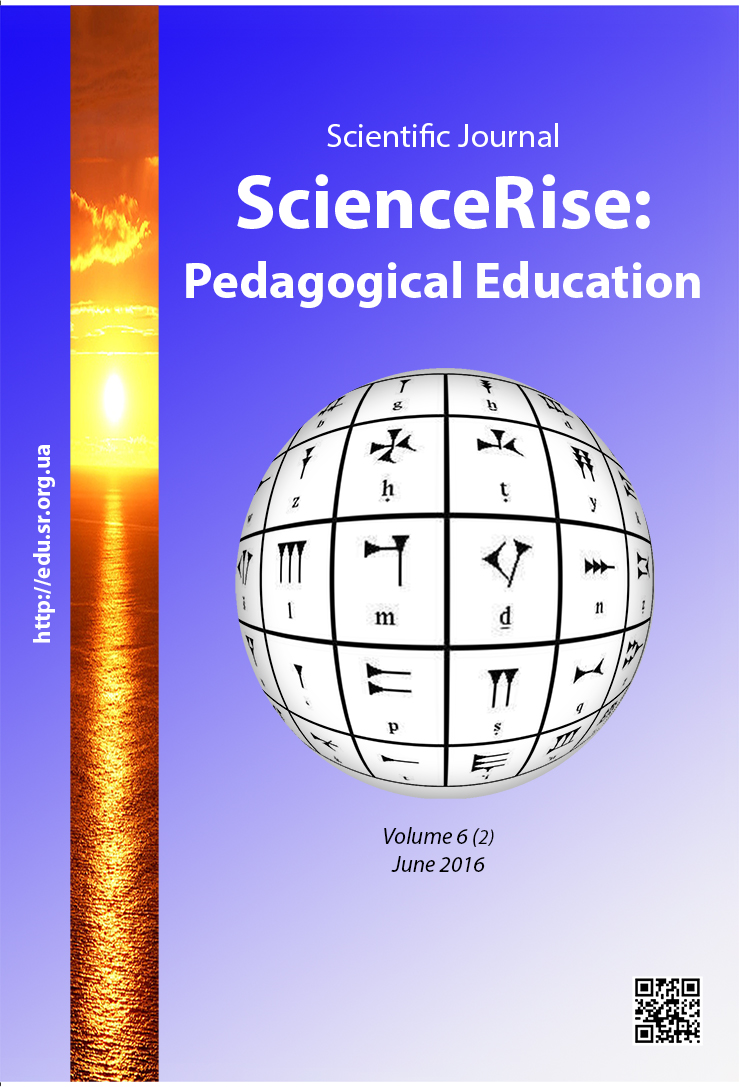Management by quality of general secondary education at regional level: theoretical aspect
DOI:
https://doi.org/10.15587/2519-4984.2016.71533Keywords:
quality of education, management by quality of general secondary education, monitoring of quality of education, regional system of educationAbstract
The article is grounded the problem of management by quality of general secondary education, it is proved that actuality of this problem was reasoned by increasing needs of general educational potential of nation, guaranteeing of competitiveness of graduates of general educational schools and universities in labor market both within the State and at the international level; it is determined that the quality of education characterized not only the result of educational activity of graduate of teaching institution, but factors of forming of this result, which depended on the aim of education, content of methodology, organization and technology; it is proved that management by quality of education at the regional level would foresee the analysis of quality of general secondary education, its assessment, working out of conceptual approaches to the projecting and modeling of innovative processes, realization of educational standards as the basis for objective monitoring of quality of education, working out of information technologies in systems of management by quality of education
References
- Bereznyak, E. S. (1996). Realization of principle of democratization in management activity of director of school. Kyiv: ISDO, 64.
- Boulakh, І. E.; Boulakh, І. E. (Ed.) (2002). Notion of quality in education. System of monitoring and assessment of quality of education. Kyiv, 139.
- Vastchenkо, L. М. (2005). Management of innovative processes in general secondary education of a region. Kyiv: Publishing organization «Tyrazh», 380.
- Danylenkо, L. І.; Kremen’, V. G. (Ed.) (2008). Management in education. Encyclopedia of education. Кyiv: Khyncom Inter, 1036.
- El’nikovа, G. V. (1999). Scientific bases of development of management by general secondary education in the region. Kharkiv: DАККО, 303.
- Коnarzhevskiy, Yu. А. (1999). Management and interschool management. Мoscow: Educational center « Pedagogic search», 224.
- Loukina, T. O. (2004). State management by quality of general secondary education in Ukraine. Кyiv, 342.
- Lyashenkо, О. V. (2007). Organizational and methodical principles of monitoring of quality of education. Pedagogy and psychology, 2, 34–40.
- Panasyuk, V. (2007). Usage of experience of management by quality of education. Textbook for director, 8, 42–51.
- Pykel’na, V. S. (2004). Management by school in two parts. Chep. 1. Kharkiv: Publishing group «Basis», 112.
- Potashnyk, М. М. (1990). Democratization of management by school. Мoscow: Knowledge, 77.
- Soubetto, А. (2000). Quality of education: problems of assessment and monitoring. Education, 2, 62–66.
- Таlyzin, М. (2006). Problems of quality of education. Кyiv: Scientific thought, 112.
- Yakhnin, Ya. K. (2006). Contemporary approaches to quality of education. Кyiv: Scientific thought, 143.
- Кravchenkо, Yu., Lebedev, О. (2007). Quality of education – factor of growth of quality of life. Standards and quality, 6, 20–22.
- Bоrysovа, E. (2003). Quality of education and place of higher school in the society. Аlmа-mater, 11, 27–33.
- Zaychouk, V. (2009). Management of quality of education as component of State educational policy. Pedagogy and psychology, 1, 56–78.
- Novikova, М. M. (2007). Regional management: brief of lectures. Kharkiv: KNАМG, 94.
- Vastchenko, L., Zhebrovs’kiy, B. (Eds.) (2001). Pedagogical innovations of capital’s education: theory and practice. Кyiv: КМPU, 348.
- Мestchaninov, О. P. (2006). Methodic of assessment of development of University education. Мykolaiv: Ed. МSHU named after Petro Моguila, 96.
- Loukina, Т. О. (2006). Monitoring of quality of education: theory and practice. Кyiv: «School world», Ed. L. Galitsina, 128.
Downloads
Published
How to Cite
Issue
Section
License
Copyright (c) 2016 Світлана Федорівна Одайник

This work is licensed under a Creative Commons Attribution 4.0 International License.
Our journal abides by the Creative Commons CC BY copyright rights and permissions for open access journals.
Authors, who are published in this journal, agree to the following conditions:
1. The authors reserve the right to authorship of the work and pass the first publication right of this work to the journal under the terms of a Creative Commons CC BY, which allows others to freely distribute the published research with the obligatory reference to the authors of the original work and the first publication of the work in this journal.
2. The authors have the right to conclude separate supplement agreements that relate to non-exclusive work distribution in the form in which it has been published by the journal (for example, to upload the work to the online storage of the journal or publish it as part of a monograph), provided that the reference to the first publication of the work in this journal is included.







